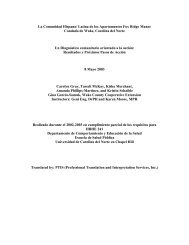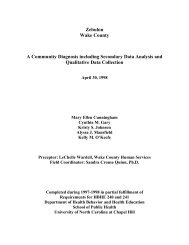The Health bulletin [serial] - University of North Carolina at Chapel Hill
The Health bulletin [serial] - University of North Carolina at Chapel Hill
The Health bulletin [serial] - University of North Carolina at Chapel Hill
Create successful ePaper yourself
Turn your PDF publications into a flip-book with our unique Google optimized e-Paper software.
a<br />
14 <strong>The</strong> <strong>Health</strong> Bulletin Jaiiuarij, J 927<br />
tioiis. uiuisunlly ploasant. always oxpressinj:<br />
in some way uiuleilyinijr wishes.<br />
Usually his fabric<strong>at</strong>ions are such as to<br />
give the child some feeling <strong>of</strong> superiority<br />
to his fellows.<br />
<strong>The</strong>re are here two types <strong>of</strong> untruths.<br />
First, there is defensive lying<br />
aimed to protect the individual from<br />
consequences. This <strong>of</strong>ten tends to shift<br />
blame to others. <strong>The</strong> other type is the<br />
fabric<strong>at</strong>ion—a built-up picture, a projection<br />
<strong>of</strong> wishes and desires into realiz<strong>at</strong>ion<br />
in words, which if repe<strong>at</strong>ed <strong>of</strong>ten<br />
enough, bring firm belief. Both these<br />
types occur <strong>at</strong> some time in practically<br />
all children. Wisely handled, with a<br />
minimum <strong>of</strong> emotion and fear-provoking<br />
methods, they soon disappear.<br />
Never provoke defensive lies. It is<br />
quite unnecessary. <strong>The</strong> imagin<strong>at</strong>ive lies<br />
indic<strong>at</strong>e things wanted by the children.<br />
<strong>The</strong>se, or some other real outlet, should<br />
be provided. Normally, fabric<strong>at</strong>ing<br />
ceases with the development <strong>of</strong> realistic<br />
life. It is not necessarily undesirable.<br />
Stealing has many meanings. <strong>The</strong><br />
small child has little realiz<strong>at</strong>ion <strong>of</strong><br />
"mine and thine." It must be built up<br />
in him slowly and p<strong>at</strong>iently. In this<br />
period he takes wh<strong>at</strong> he desires—hardly<br />
stealing. L<strong>at</strong>er, bolder children may<br />
resort to the same method <strong>of</strong> fulfilling<br />
desires. Here the training p<strong>at</strong>terns<br />
established by the parent are especially<br />
important. Children steal because they<br />
are expected to; because <strong>of</strong> urgent<br />
physical needs; to gr<strong>at</strong>ify desires; because<br />
<strong>of</strong> buried conflicts and tensions<br />
th<strong>at</strong> are relieved by the act ; to revenge<br />
themselves on parents or others ; because<br />
they are trained to do it, either<br />
by example, or because this is the only<br />
way they can get things <strong>at</strong> home ; or to<br />
obtain means <strong>of</strong> acquiring the respect<br />
<strong>of</strong> their companions.<br />
Another boy comes from a hardpressed<br />
family. His f<strong>at</strong>her is an inefficient<br />
worker. An older brother is a<br />
thief. <strong>The</strong> boy is fully aware <strong>of</strong> the<br />
family difficulties. In school he is<br />
viewed askance and is expected to steal<br />
and lie. He does. He has ample p<strong>at</strong>terns<br />
and very poor training in ethical<br />
standards. As he is slow in learning,<br />
he is denied the compens<strong>at</strong>ion <strong>of</strong><br />
superior performance in school. Being<br />
strong physically, he is quite a bully.<br />
To escape his school discomfort and<br />
to demonstr<strong>at</strong>e his independence, he<br />
plays truant. Lyiug gets him out <strong>of</strong><br />
uncomfortable situ<strong>at</strong>ions. Further, extravagant<br />
stories <strong>of</strong> his prowess and<br />
adventures gain much <strong>at</strong>tention and admii<strong>at</strong>ion<br />
from the other children. His<br />
ability <strong>at</strong> stealing also excites their<br />
admir<strong>at</strong>ion, particularly since he spends<br />
his gains on them, thus making a gre<strong>at</strong><br />
splurge. And so the vicious circle <strong>of</strong><br />
evasion, lying, stealing goes on, giving<br />
him the s<strong>at</strong>isfaction denied through<br />
more legitim<strong>at</strong>e channels.<br />
Another boy disapproves <strong>of</strong> a number<br />
<strong>of</strong> things his f<strong>at</strong>her does. He feels himself<br />
neglected and unwelcome in the<br />
home, as he undoubtedly is. He sometimes<br />
steals things he wants but cannot<br />
get from the f<strong>at</strong>her, despite an ample<br />
income. More frequently, however, he<br />
steals things he does not want because<br />
"f<strong>at</strong>her will have to pay for them"—<br />
clear example <strong>of</strong> the revenge motive.<br />
A girl <strong>of</strong> seventeen is troubled <strong>at</strong><br />
times by "bad thoughts." She becomes<br />
rapidly more tense, somewh<strong>at</strong> unclear<br />
in her mind ; feels compelled to "do<br />
something." Usually she takes some<br />
object. <strong>The</strong> doing and the risk produce<br />
some emotional excitement. Afterward<br />
she is clear and calm. Here an emotional<br />
complex, having nothing to do<br />
with stealing, determines the activity.<br />
Stealing is a substitute act for discharge<br />
<strong>of</strong> emotion.<br />
5. Feab<br />
Do I Frighten My Child So He Becomes<br />
Timid and Fearful<br />
By: Thre<strong>at</strong>s <strong>of</strong> the "bogey-man"<br />
Thre<strong>at</strong>s <strong>of</strong> leaving him Thre<strong>at</strong>s <strong>of</strong><br />
hoi-rible punishments Telling him<br />
frightening stories Inflicting my fears<br />
and terrors on him Constant worry<br />
over his minor accidents, ailments, and<br />
habits<br />
Fear Is Our Most Important Emotion;<br />
A Little Goes A Long Way<br />
It is a sure sign <strong>of</strong> weakness to resort<br />
to thre<strong>at</strong>s to gain obedience from<br />
a child. When thre<strong>at</strong>s are not carried<br />
out, because to do so would be utterly<br />
impossible, or because so many are<br />
made th<strong>at</strong> they cannot be remembered,<br />
they soon lose force. At first they work,<br />
because the child fears something may<br />
actually happen. L<strong>at</strong>er, they are either<br />
disregarded or become imbedded and


![The Health bulletin [serial] - University of North Carolina at Chapel Hill](https://img.yumpu.com/33495252/20/500x640/the-health-bulletin-serial-university-of-north-carolina-at-chapel-hill.jpg)




![Bulletin of the North Carolina Board of Health [serial] - University of ...](https://img.yumpu.com/48032016/1/153x260/bulletin-of-the-north-carolina-board-of-health-serial-university-of-.jpg?quality=85)
![The Health bulletin [serial] - University of North Carolina at Chapel Hill](https://img.yumpu.com/47603625/1/169x260/the-health-bulletin-serial-university-of-north-carolina-at-chapel-hill.jpg?quality=85)
![The Health bulletin [serial] - University of North Carolina at Chapel Hill](https://img.yumpu.com/47242858/1/169x260/the-health-bulletin-serial-university-of-north-carolina-at-chapel-hill.jpg?quality=85)
![The Health bulletin [serial] - University of North Carolina at Chapel Hill](https://img.yumpu.com/43204263/1/172x260/the-health-bulletin-serial-university-of-north-carolina-at-chapel-hill.jpg?quality=85)
![The Health bulletin [serial] - University of North Carolina at Chapel Hill](https://img.yumpu.com/41981074/1/163x260/the-health-bulletin-serial-university-of-north-carolina-at-chapel-hill.jpg?quality=85)

![The Health bulletin [serial] - University of North Carolina at Chapel Hill](https://img.yumpu.com/40912928/1/164x260/the-health-bulletin-serial-university-of-north-carolina-at-chapel-hill.jpg?quality=85)

![The Health bulletin [serial] - University of North Carolina at Chapel Hill](https://img.yumpu.com/35643061/1/167x260/the-health-bulletin-serial-university-of-north-carolina-at-chapel-hill.jpg?quality=85)
![Biennial report of the North Carolina State Board of Health [serial]](https://img.yumpu.com/34024350/1/166x260/biennial-report-of-the-north-carolina-state-board-of-health-serial.jpg?quality=85)
